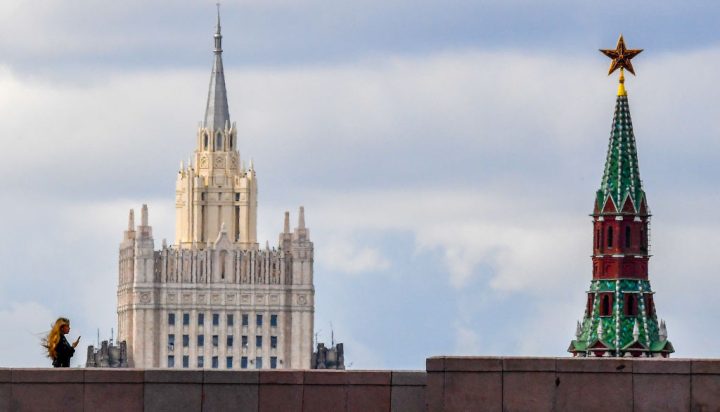Perfidious Albion is at it again. The Kremlin’s increasingly unhinged obsession with seeing a British hand behind its various upsets has now manifested itself in a claim that the UK is behind the establishment of a death squad operating in Africa.
The claim, trumpeted across Russia’s state-run media, is that MI6 is behind a ‘punitive saboteur unit consisting of Ukrainian nationalists and neo-Nazis’ being trained for operations in Africa. According to an unnamed ‘military-diplomatic source,’ London requested in July that the Ukrainian government help it recruit this force.
Russians are at once warmly Anglophile and deeply Anglophobe, a paradoxical relationship unlike any other
In response, the Ukrainian Security Service and Main Intelligence Directorate worked with MI6 and the SAS to pick at least a hundred veterans ‘with combat experience on the “eastern front”’ to be commanded by a certain ‘Lt. Colonel V. Praschyuk.’ According to the Russians, this 43-year-old action man has been a parliamentarian, a special forces commander, a marine and even a participant in a joint operation by British and Ukrainian intelligence in Zimbabwe of all places.
His unit is apparently meant to shortly head from the Danube port of Izmail to Omdurman in Sudan, where it would begin its mission ‘carrying out acts of sabotage on key infrastructure in Africa and assassinating African leaders who favour co-operation with Russia’. This clearly reflects Moscow’s opportunistic bid to frame itself as the friend of a post-colonial Africa, stepping in where former masters now abandon the continent.
This is all very exciting stuff, and worthy of a blockbuster movie or two. After all, Yevgeny Prigozhin, head of the Wagner mercenary group and on-and-off mutineer, has bankrolled several films glorifying and whitewashing his men’s operations in Africa. However, this report is also deeply implausible.
Whatever antics it may have been involved in, in the past, MI6 and the British government are not really in the death squads and foreign coups business any more. Lest this sound naïve, the reason is not so much morality as practicality. Such operations are risky, prone to be counter-productive and, in the modern information age, pretty much bound to leak. In particular, openly recruiting foreign soldiers for an operation – one that is not being carried out behind multiple cut-out identities to ensure secrecy and deniability – is a particular no-no.
But this is all just tedious pedantry compared with the baroque lushness of the Kremlin’s imagination. In recent days, key Putin ally Nikolai Patrushev has claimed that Kyiv is harvesting the organs of wounded Ukrainian soldiers for export. Meanwhile, the head of Russia’s Foreign Intelligence Service, the not-unintelligent Sergei Naryshkin, has expressed his fears about the ‘biomechanoids’ apparently running rife in Europe.
In particular, the UK often features as the subtle and sinister power behind these threats, making up for in cunning what it may lack – compared with the Americans – in raw muscle. As one nationalist Russian news site put it, ‘London’s policy has not changed over the years, the British continue to love working through proxies, while remaining “clean”.’ Thus, Britain was allegedly behind the actions of imprisoned opposition leader Alexei Navalny, Ukraine’s 2013-14 ‘Revolution of Dignity,’ and even drone attacks on Moscow and Crimea.
It may be reassuring to know someone still thinks of Britain as punching so comprehensively above its weight, but it is also more than a little perplexing. In part, attacking the UK is considered a safer way to attack America, the other half of the favoured formulation of the ‘Anglo-Saxons’ (as if London and Washington were anywhere near as closely in lockstep as that implies). More than that, though, there is a complex historical legacy at work.
Bookends of Europe – of, but not in, the continental mainstream – Russia and Britain have long been keenly aware of the other. English traders were among the early organised mercantile operations in Russia and Peter the Great visited to learn the arts of shipbuilding and naval warfare. Tsars from Ivan the Terrible onwards have pondered the possibilities were Russian land power to be combined with British naval might. At other times, whether in the ‘great game’ of Southern Asia or Crimea, Russia and Britain have been rivals. Added to this, although today’s Russia is not Soviet, our military intervention and intelligence operations in the 1918-22 Civil War still rankle.
Russians are at once warmly Anglophile and deeply Anglophobe, a paradoxical relationship unlike theirs with any other nation. In the circumstances, the fact that we continue to loom so large in their geopolitical imagination is at once a credit to our still-effective intelligence services and also a mixed political blessing.







Comments